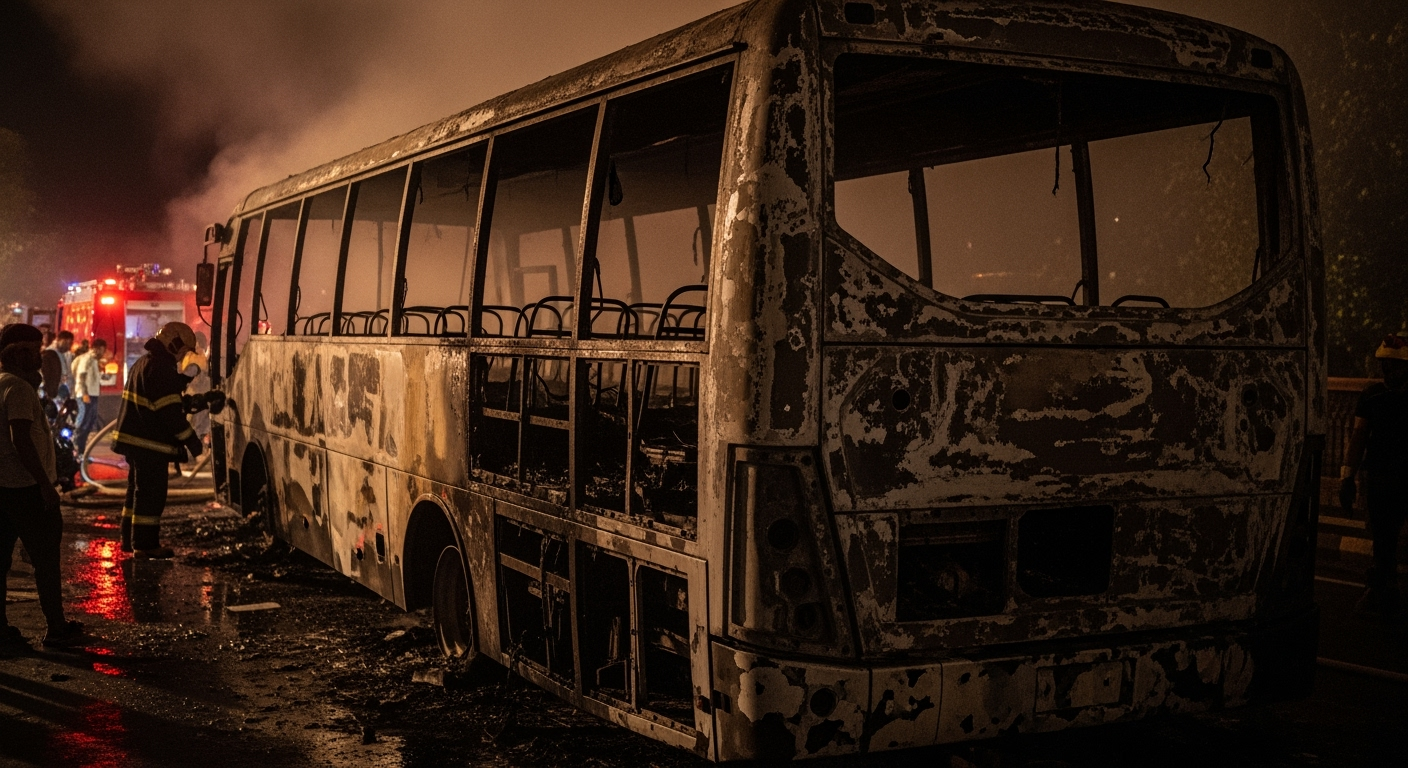Related Articles

U.S. Pushes for Rapid International Force Deployment in Gaza Amid Ceasefire Efforts




Kurnool, Andhra Pradesh – A devastating fire erupted on an overnight passenger bus early Friday morning on the Hyderabad-Bengaluru highway in India, killing at least 20 people and injuring several others. The catastrophic incident, occurring near Chinna Tekur village in Andhra Pradesh's Kurnool district, was sparked by a collision with a motorcycle, transforming a routine journey into a scene of unspeakable tragedy. The majority of the bus's 40 to 44 passengers were asleep when the blaze rapidly engulfed the vehicle, trapping many inside and raising profound concerns about road safety and emergency preparedness in India's extensive private bus network.
The fatal chain of events unfolded between 3:00 AM and 3:30 AM IST when a private Volvo bus, operated by Kaveri Travels and traveling from Hyderabad in Telangana state to Bengaluru in Karnataka state, collided with a motorcycle. Preliminary investigations suggest the motorcycle, reportedly attempting to overtake the bus, rammed into its rear and became lodged underneath the vehicle. The impact caused the motorcycle's fuel tank to rupture, leading to a significant fuel leak. Friction generated by the motorcycle being dragged under the bus then created sparks, igniting the spilled fuel and triggering an immediate and intense fire.
The blaze spread with alarming speed, consuming the entire bus within minutes. While some initial reports indicated the bus's fuel tank also burst, a senior police official later clarified that the bus's main fuel tank remained intact, attributing the fire's rapid intensification to combustible materials within the vehicle. The inferno's ferocity and swift progression left little chance for many of the sleeping passengers to escape.
As smoke filled the bus, the driver, identified as Miryala Lakshmiah, reportedly stopped the vehicle and attempted to use a fire extinguisher, but the intensity of the flames rendered his efforts futile. The sudden conflagration trapped many passengers, with distressing accounts indicating that the bus's main door became jammed, further hindering escape routes. In a desperate bid for survival, between 12 and 18 passengers managed to escape through windows, some by breaking the glass, often sustaining burn injuries in the process. Among those who perished were the motorcycle rider and 20 bus passengers. Eleven bodies have been identified, with efforts ongoing to identify the remaining nine, some of whom were severely charred, potentially requiring DNA testing. The driver, co-driver G. Siva Narayana, and a cabin attendant, Miryala Ashok, were among those who escaped unharmed.
Local residents were reportedly the first responders, rushing to the scene to assist in rescue efforts before fire tenders and police teams arrived. The injured were quickly transported to the Kurnool Government General Hospital for urgent medical attention. This collaborative response, albeit initiated by the quick thinking of locals, underscores the chaotic and immediate nature of the disaster.
Authorities have launched a full investigation into the tragic incident. Forensic experts are meticulously examining the wreckage to ascertain the precise sequence of events and factors contributing to the rapid spread of the fire and the high casualty count. The investigation will aim to clarify details surrounding the collision, the nature of the fuel ignition, and the effectiveness of the bus's safety features, particularly the functionality of emergency exits and the presence of combustible materials.
The Kurnool bus fire has reignited critical discussions regarding public transport safety standards in India. This incident marks the second deadly bus fire in the country within a two-week period. Earlier this month, a separate bus fire in Rajasthan claimed 20 to 22 lives, an incident later attributed to a suspected short circuit in the vehicle's air-conditioning system. The recurrence of such devastating events highlights systemic challenges within the private bus sector, including concerns over vehicle maintenance, adherence to safety regulations, and emergency preparedness. Reports suggest that many long-distance private bus operators, often operating on thin margins, may compromise on regular inspections and safety checks. Notably, the Kaveri Travels bus involved in the Kurnool accident had accumulated 16 traffic violations in Telangana alone, indicating a history of non-compliance with traffic rules.
The tragic loss of life prompted condolences from high-ranking officials. Prime Minister Narendra Modi expressed his sorrow, announcing an ex gratia payment of ₹2 lakh (approximately $2,400 USD) from the Prime Minister's National Relief Fund (PMNRF) to the next of kin of each deceased, with ₹50,000 for the injured. Andhra Pradesh Chief Minister N. Chandrababu Naidu also conveyed his condolences and instructed district officials to ensure swift relief measures and medical assistance for the survivors. President Droupadi Murmu termed the accident "deeply unfortunate," extending heartfelt condolences to the bereaved families and praying for the speedy recovery of those injured.
The incident on National Highway 44 underscores the urgent need for a comprehensive review of night-time highway safety protocols, emergency preparedness in long-distance passenger vehicles, and stricter enforcement of safety regulations. As investigations continue, families mourn their lost loved ones, and the nation grapples with the grim reality of recurring road tragedies, renewed calls for improved safety infrastructure and compliance across India's extensive road transport network are growing louder.